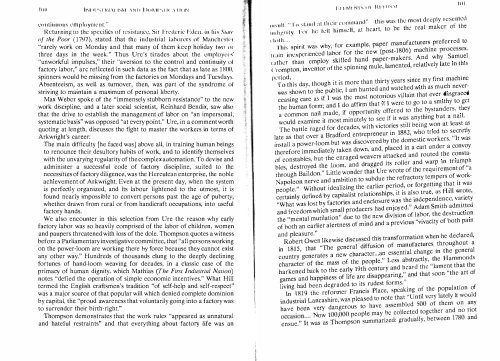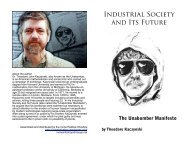CONTENTS - ouroboros ponderosa
CONTENTS - ouroboros ponderosa
CONTENTS - ouroboros ponderosa
You also want an ePaper? Increase the reach of your titles
YUMPU automatically turns print PDFs into web optimized ePapers that Google loves.
11111 INIHI .... ,I";\ ] 1.'\1\.1 .. \NII 1)(II\II-\ JI( ,\ [ '[( IN<br />
C( lilt il l lH HIS cmph )YIllC II t."<br />
Rdurning to the specifics of t"lsistallcc, Sir J:rcdcric 1':dcll, in his ,\'/fI','<br />
of the Poor (1797), stated that the industrial lahorers of Manches"'l<br />
"rarely work on Monday and that many of them keep holiday two or<br />
three days in the week." Thus Vre's tirades about the employe,,,'<br />
"unworkful impulses," their "aversion to the control and conti nuity or<br />
factory labor," arc re!lccted in such data as the fact that as late as 1 H().<br />
spinners would be missing from the factories on Mondays and Tuesdays.<br />
Absenteeism, as well as turnover, then, was part of the syndrome or<br />
striving to maintain a maximum of personal liberty.<br />
Max Weber spoke of the "immensely stubborn resistance" to the new<br />
work discipline, and a later social scientist, Reinhard Bendix, saw also<br />
that the drive to establish the management of labor on "an impersonal,<br />
systematic basis" was opposed "at every point." Vre, in a comment worth<br />
quoting at length, discusses the fight to master the workers in terms of<br />
Arkwright's career:<br />
The main difficulty [he face d was j above all, in training human beings<br />
to renounce their desultory habits of work, and to identify themselves<br />
with the unvarying regularity of the complex automation. To devise and<br />
administer a successful code of factory discipline, suited to the<br />
necessities of factory diligence, was the Herculean enterprise, the noble<br />
achlevment of Arkwnght. Even at the present day, when the system<br />
IS perfectly organized, and its labour lightened to the utmost, it is<br />
found nearly impossible to convert persons past the age of puberty,<br />
whether drawn from rural or from handicraft occupations, into useful<br />
factory hands.<br />
We also encounter in this selection from Vre the reason why early<br />
factory labor was so heavily comprised of the labor of children, women<br />
and paupers thrcatened with loss of the dole. Thompson quotes a witness<br />
before a Parliamentary investigative committee, that "all persons working<br />
on the power-loom are working there hy force because they cannot exist<br />
any other way." Hundreds of thousands clung to the deeply declining<br />
fortunes of hand-loom weaving for decades, in a classic case of the<br />
primacy of human dignity, which Mathias (The First Industrial Nazion)<br />
notes "defied the operation of simple economic incentives." What Hill<br />
termed the English craftsmen's tradition "of self-help and self-respect"<br />
was a major source of that popular will which denied complete dominion<br />
by capital, the "proud awareness that voluntarily going into a factory was<br />
to surrender their birth-right."<br />
Thompson demonstrates that the work rules "appeared as unnatural<br />
and hateful restraints" and that everything about factory life was an<br />
I :.I I-M! Nt \ II· RI't'I IS:\1 till<br />
11IlIlt. "T(I slaJld at their cU1llmand" -this was the most deeply rcc<br />
ntctl<br />
.<br />
Illdigllity. 1:01' he felt himsdf, at heart, to be the real maker of the<br />
clolh....<br />
f d to<br />
This spirit was why for example, paper manufacturers pre errc<br />
Irain<br />
'<br />
ilexperienced I;bor for the new (post-1806) machine processes,<br />
I ather than employ skilled hand paper-makers. And why Samuel<br />
( 'rompton, inventor of the spinning mule, lamented, relatJvely late m thIS<br />
pniod,<br />
To this day, though it is more than thirty years smce my Ifst mac me<br />
was shown to the public, I am hunted and watched WIth as mUCh nver.<br />
.<br />
ceasing care as if I was thc most notorious villam that ever dIsgraced<br />
the human form; and I do affirm that If I were to go to a smIthy to gct<br />
a common nail made, if opportunity offered to the bystanders, they<br />
would examine it most minutely to see if it was anythmg but a naIl.<br />
The battle raged for decades, with victories still bemg won at least as<br />
late as that over a Bradford entrepreneur in 1882, who tned to s,?crely<br />
install a power-loom but was discovered by the domestIC workers. It was<br />
therefore immediately taken down, and, placed in a cart under a convoy<br />
of constables, but the enraged weavers attacked and routed the consta<br />
bles, destroyed the loom, and dragged its roller and warp m tnum , h<br />
through Baildon." Little wonder that Vre wrote of the reqUIrement of <br />
.<br />
Napoleon nerve and ambition to subdue the refractory tempers of :,ork<br />
.<br />
people." Without idealizing the earlier period, or forgettmg that It was<br />
certainly defined by capitalist relationships, it is also true, as HIli ,,:,rote,<br />
"What was lost by factories and enclosure was the Jfldcpend nce, va:lety<br />
and freedom which small producers had enjoyed." Adam SmIth admJlted<br />
the "mental mutilation" due to the new division of l , bor, the destruchon<br />
of both an earlier alertness of mind and a prevIous VIvaCIty of both pam<br />
and pleasure."<br />
.<br />
.<br />
f'<br />
h'<br />
d i d<br />
Robert Owen likewise discussed this transformatIon when he ec are ,<br />
in 1815, that "The general diffusion of mautactures throughout a<br />
country generates a new character. .. an essentlal change m the general<br />
character of the mass of the people." Less abstractly, the Hammonds<br />
harkened back to the early 19th century and heard the "lament that the<br />
games and happiness of life are disappearing," and that soon "the art of<br />
living had been degraded to its rudest forms."<br />
.<br />
. .<br />
In 1819 the reformer Francis Place, speakmg ot the populatIon of<br />
industrial Lancashire, was pleased to note that "Until very lately It would<br />
have been very dangerous to have assembled 500 of them on any<br />
. ' Now 100 000 people may he collected together and no not<br />
occasIOn.... ,<br />
.<br />
1780 d<br />
ensue." It was as Thompson summarized: gradually, between an






